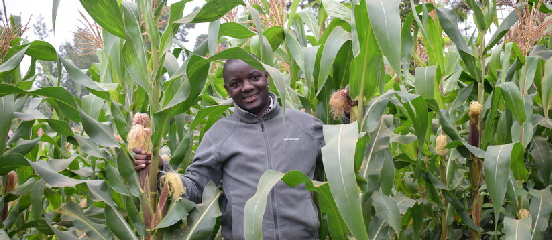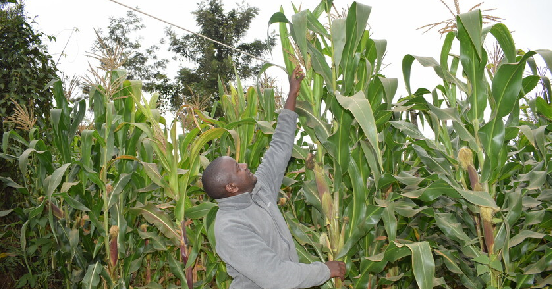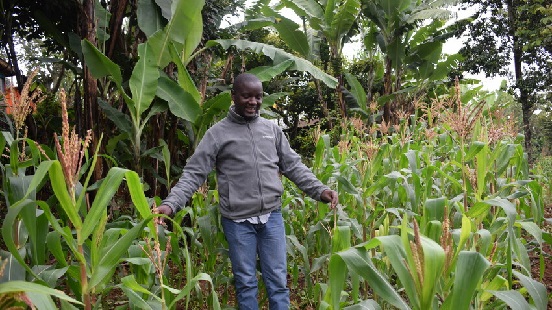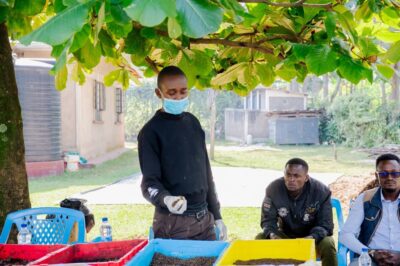News
7 September 2021
Fuelling smallholder farmers’ resilience through Regenerative Agriculture

Although agriculture is the backbone of Embu County and supports the livelihoods of people living there, food security for smallholder farmers in the county is undermined by low yields of all major crops. The low productivity has been attributed to declining soil fertility, climate change, inadequate extension support and limited access to inputs as well as poor farming methods, resulting in vulnerable households.
Continuous and draining farming practices, low and inappropriate application of soil amendments, as well as erosion, have given rise to poor soils that are unable to achieve maximum productivity.
When 31-year-old Moses Mbogo began farming, he adopted the practices that he saw his parents using in maize production. He would use the maize grains from his previous harvest as seeds, squeeze three kernels per hole and also plant late, long after the onset of rains.
As a result, the germination rate was low, the maize plants stunted and weak and his production and that of his neighbours so low that some had abandoned maize farming for other crops.
The poor yields were barely enough to feed their families, let alone sell, meaning they got no return on investment from months of labour. This made their farming unsustainable and their livelihoods non-existent due to scarcity of food and zero incomes.
‘What we didn’t know is that the low production was a result of depleted nutrients in the soil due to years of mono-cropping and continued application of the wrong fertility enrichers. When I did a soil test, my soil was found to be very acidic, yet maize thrives in a neutral pH,’ said Moses during an interview at his farm in Manyatta.
Fortunately for him, he was among the 137 village-based advisors (VBAs) recruited by the Regenerative Agriculture project, which is funded by the IKEA Foundation through AGRA and being implemented by Farm Africa in Embu County. The initiative is seeking to deploy appropriate Regenerative Agriculture practices by combining local and traditional knowledge with global best practices to realise high yields.
‘After I was enrolled by Farm Africa as a village-based advisor, we underwent training on regenerative agriculture practices that would improve the fertility of our soils and increase our yields. We were then required to train other farmers in our village on the same.’
During the training sessions he learnt about certified seeds suitable for his region, proper land preparation, correct spacing and seed rate, spraying programmes for maize and legumes, agroforestry, crop rotation, application of organic manure and mulching.

After applying the regenerative agriculture farming approach in a demonstration plot, the results are now visible. He can hardly reach the top of the towering maize stalks and a glance at his lush maize crop intercropped with climbing beans leaves one with no doubt that a plentiful harvest awaits him.
‘I used a combination of manure and fertiliser, certified seeds which I planted one per hole and also applied the correct spacing. Mulching has helped me to suppress weeds,’ he said proudly.
The control demo plot where he did not apply the RA practices stands in blatant contrast as the plants are retarded and unhealthy.

Through his demos, he has trained 132 farmers (50 men and 82 women) in his village on regenerative agriculture and he has seen quite a number of them adopting the valuable techniques.
‘A considerable number of farmers have begun embracing regenerative agriculture practices after seeing the tangible demonstration plots’ results. Some of the technologies leading in uptake include use of organic manure, crop rotation, use of contours for soil water management and agroforestry. We have seen farmers’ yields improving significantly as a result of embracing these techniques,’ said Patrick Nyaga, the Farm Africa Coordinator for the RA Project.
He adds that the VBAs have been instrumental in increasing the uptake by transferring skills on good agricultural practices to the farmers through training and also linking them with input suppliers for the supply of certified seeds, fertilisers and crop protection products.
‘In their role of being the primary distributors of inputs and aggregators of commodities at the village level, the VBAs are able to make a commission from that and it is through such incentives that this extension model will become sustainable,’ he continued.
With improved production comes the need for market linkages to enable farmers to sell their produce at profitable rates. In many instances, farmers fall prey to poor prices offered by traders due to an urgent need for money to meet basic household needs such as paying school fees upon harvesting and inadequate knowledge on post-harvest management.
To fill this gap, the project is training the VBAs, cooperatives and other medium aggregators in post-harvest handling techniques such as drying of cereals and proper storage, developing seasonal production plans and warehouse management.
Patrick Nyaga weighs in on this by noting: ‘There is an alarming cry from farmers as they feel they don’t get favourable prices from market players. With the improved production that has been brought about by application of regenerative agriculture practices, aggregation will help them to negotiate with the off-takers to get fair and reliable prices.’
Through engaging diverse players in the value chain such as input providers, buyers and the government, replication and scaling of these beneficial practices will be spurred. To achieve food security and nutrition in the country, it is crucial to adopt environmentally sustainable practices so as to have more resilient soils that can better withstand climate shocks like flooding, drought and pest infestation.




